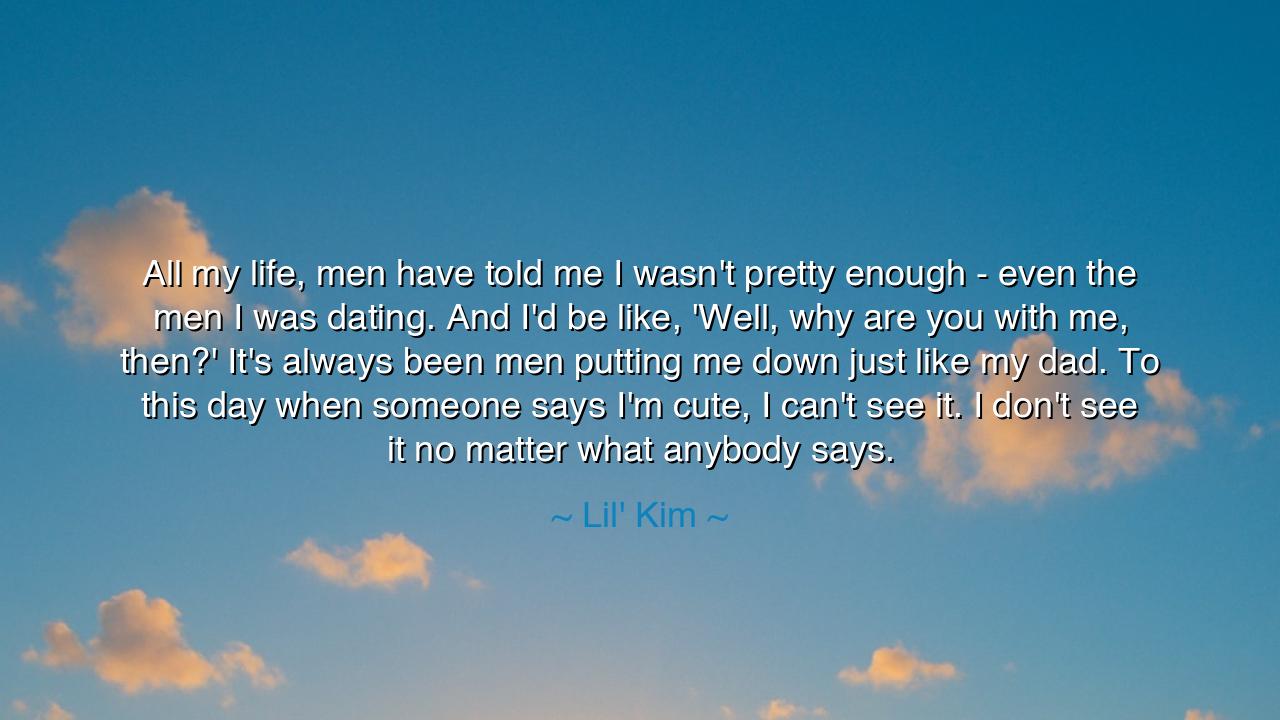
All my life, men have told me I wasn't pretty enough - even the
All my life, men have told me I wasn't pretty enough - even the men I was dating. And I'd be like, 'Well, why are you with me, then?' It's always been men putting me down just like my dad. To this day when someone says I'm cute, I can't see it. I don't see it no matter what anybody says.






Hearken, O seekers of wisdom, to the poignant confession of Lil’ Kim, who laments: “All my life, men have told me I wasn't pretty enough - even the men I was dating. And I'd be like, 'Well, why are you with me, then?' It's always been men putting me down just like my dad. To this day when someone says I'm cute, I can't see it. I don't see it no matter what anybody says.” In these words lies a meditation on perception, self-worth, and the enduring shadow of early influence. Lil’ Kim speaks not merely of beauty, but of the silent wounds that shape how one sees oneself, and the difficulty of reconciling external praise with internalized critique.
From the earliest civilizations, sages recognized that the judgments of authority and kin could leave deep marks upon the soul. The Greek tragedians told of children shaped by the words and actions of parents, of heroes burdened by the shadow of familial criticism or neglect. Lil’ Kim’s reflection mirrors this timeless understanding: the voice of a father, of early men in her life, became a lens through which she viewed herself. When others echoed these judgments, the wounds of the past were reopened, and the perception of self became clouded by inherited doubt.
The words illuminate the struggle between external validation and internal truth. She questions, “Well, why are you with me, then?”, revealing the incongruity between action and judgment, affection and critique. History shows us that many have grappled with similar contradictions. Consider Queen Elizabeth I, who, though celebrated as one of England’s greatest monarchs, wrestled with early rejection and the taint of family scandal. The external admiration she received often clashed with her internal insecurities, yet she forged a legacy through perseverance and self-assertion. Lil’ Kim’s struggle is likewise a testament to the challenge of claiming one’s own worth in the face of early and repeated denigration.
Yet there is also a lesson in the persistence of self-perception. Lil’ Kim confesses that even when others call her cute, she cannot see it. This is the enduring power of early influence: words of criticism, especially from trusted figures, imprint upon the mind, shaping perception long after the original voice has faded. The ancients understood this truth, teaching that the formation of character and self-regard begins in youth, and that negative reinforcement, if left unchallenged, can become a lifelong echo.
Her reflection also speaks to resilience and awareness. By naming the pattern — that men, like her father, put her down — she illuminates the mechanism of influence. This act of recognition is itself a step toward liberation. Socrates taught that knowledge of one’s condition is the first step toward mastery. To acknowledge the inherited and repeated critiques is to begin the journey of reclaiming one’s own vision and worth, even when it remains difficult to internalize.
From this meditation emerges a lesson for all: the judgments of others, no matter how repeated, need not define your self-perception. While early influence may shape belief, reflection, awareness, and deliberate affirmation can reshape the mind. History offers guidance in the lives of those who overcame early scorn: Abraham Lincoln, born into poverty and derided for his appearance and social status, learned to value his own worth, ultimately leaving a legacy that dwarfed the judgments of his youth.
Practical counsel flows from Lil’ Kim’s truth: recognize the voices that have shaped your self-perception, question their validity, and cultivate a practice of self-affirmation and reflection. Seek relationships and communities that reinforce growth rather than critique, and actively remind yourself of your value and accomplishments. By doing so, one can begin to disentangle inherited doubt from authentic self-worth.
Thus, O listener, let the words of Lil’ Kim illuminate your journey: the shadow of early critique may linger, but through reflection, recognition, and deliberate cultivation of self-worth, the light of inner truth can emerge. Honor yourself, reclaim your perception, and allow the echoes of past judgment to be replaced with the affirmation of your own enduring value and strength.






AAdministratorAdministrator
Welcome, honored guests. Please leave a comment, we will respond soon